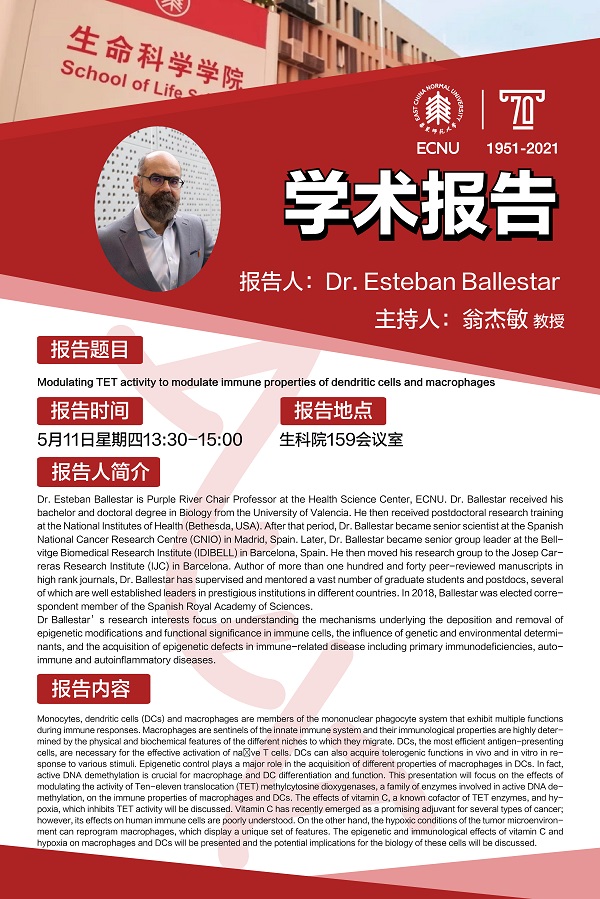报告题目:Modulating TET activity to modulate immune properties of dendritic cells and macrophages
报 告 人:Dr. Esteban Ballestar(西班牙皇家科学院院士)
主 持 人: 翁杰敏 教授
报告时间: 2023年5月11日13:30-15:00
报告地点: 生科院159会议室
报告人简介:
Dr. Esteban Ballestar is Purple River Chair Professor at the Health Science Center, ECNU. Dr. Ballestar received his bachelor and doctoral degree in Biology from the University of Valencia. He then received postdoctoral research training at the National Institutes of Health (Bethesda, USA). After that period, Dr. Ballestar became senior scientist at the Spanish National Cancer Research Centre (CNIO) in Madrid, Spain. Later, Dr. Ballestar became senior group leader at the Bellvitge Biomedical Research Institute (IDIBELL) in Barcelona, Spain. He then moved his research group to the Josep Carreras Research Institute (IJC) in Barcelona. Author of more than one hundred and forty peer-reviewed manuscripts in high rank journals, Dr. Ballestar has supervised and mentored a vast number of graduate students and postdocs, several of which are well established leaders in prestigious institutions in different countries. In 2018, Ballestar was elected correspondent member of the Spanish Royal Academy of Sciences.
Dr Ballestar’s research interests focus on understanding the mechanisms underlying the deposition and removal of epigenetic modifications and functional significance in immune cells, the influence of genetic and environmental determinants, and the acquisition of epigenetic defects in immune-related disease including primary immunodeficiencies, autoimmune and autoinflammatory diseases.
报告简介:
Monocytes, dendritic cells (DCs) and macrophages are members of the mononuclear phagocyte system that exhibit multiple functions during immune responses. Macrophages are sentinels of the innate immune system and their immunological properties are highly determined by the physical and biochemical features of the different niches to which they migrate. DCs, the most efficient antigen-presenting cells, are necessary for the effective activation of naïve T cells. DCs can also acquire tolerogenic functions in vivo and in vitro in response to various stimuli. Epigenetic control plays a major role in the acquisition of different properties of macrophages in DCs. In fact, active DNA demethylation is crucial for macrophage and DC differentiation and function. This presentation will focus on the effects of modulating the activity of Ten-eleven translocation (TET) methylcytosine dioxygenases, a family of enzymes involved in active DNA demethylation, on the immune properties of macrophages and DCs. The effects of vitamin C, a known cofactor of TET enzymes, and hypoxia, which inhibits TET activity will be discussed. Vitamin C has recently emerged as a promising adjuvant for several types of cancer; however, its effects on human immune cells are poorly understood. On the other hand, the hypoxic conditions of the tumor microenvironment can reprogram macrophages, which display a unique set of features. The epigenetic and immunological effects of vitamin C and hypoxia on macrophages and DCs will be presented and the potential implications for the biology of these cells will be discussed.
